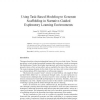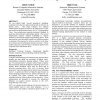6 search results - page 1 / 2 » Scaffolding Self-Explanation to Improve Learning in Explorat... |
ITS
2004
Springer
13 years 10 months ago
2004
Springer
Abstract. Successful learning though exploration in open learning environments has been shown to depend on whether students possess the necessary meta-cognitive skills, including s...
AIED
2009
Springer
13 years 11 months ago
2009
Springer
Abstract. A description of a novel domain-independent framework that automatically generates and fades scaffolding supports for task-oriented learning within exploratory environmen...
ITS
2004
Springer
13 years 10 months ago
2004
Springer
Abstract. Betty’s Brain is a teachable agent system in the domain of river ecosystems that combines learning by teaching and self-regulation strategies to promote deep learning a...
KBS
2007
13 years 4 months ago
2007
In this paper, we describe research on using eye-tracking data for on-line assessment of user meta-cognitive behavior during interaction with an environment for exploration-based ...
CHI
2000
ACM
13 years 9 months ago
2000
ACM
We can reliably build “second generation” intelligent computer tutors that are approximately half as effective as human tutors. This paper evaluates two interface enhancements...


